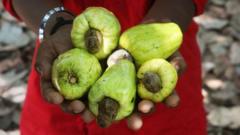Ghana is striving to increase its earnings from the lucrative cashew trade, currently relying heavily on exporting raw, unshelled nuts. Street vendors may charge significantly more for roasted cashews, exemplifying the large profit margins enjoyed downstream. Despite being the third-largest exporter of unprocessed cashew nuts globally, Ghana faces various hurdles, including low prices for farmers and unstable supply chains. Nashiru Seydou, a farmer from the northeast region, emphasizes that government assistance is crucial to harness the nation’s agricultural potential.
The disparity between the prices farmers receive and the prices consumers pay at retail highlights the struggles faced by local producers. Bright Simons, an economic commentator, points out that while farmers sell nuts at around $500 per tonne, processed cashews can fetch prices skyrocketing between $20,000 to $40,000 per tonne in international markets. Although Ghana produces around 180,000 tonnes of cashews annually, over 80% are sold in their raw form, resulting in missed opportunities for local economic development.
Mildred Akotia, the CEO of Akwaaba Fine Foods, is one entrepreneur working to change this narrative by focusing on processing. While her efforts yield only 25 tonnes of processed nuts yearly, she faces substantial financial challenges due to high-interest rates from local banks, forcing her to rely on soft loans from family and international grants. This situation accounts for only a fraction of Ghana’s processed cashew output, with most nuts exported to countries like India or Vietnam for processing and subsequently re-imported back into Ghana at competitive prices.
Efforts to encourage local processing through export bans on raw cashews have failed in the past, largely due to farmers’ resistance to policies perceived to threaten their livelihood. New proposals, including raising tariffs on raw cashew exports, aim to rectify the situation but may not address underlying industry weaknesses. Simons argues for a focus on local businesses developing better branding and marketing strategies to entice consumers, claiming that a stronger domestic demand can accelerate growth.
The input of experts, including Nobel laureate Prof. Daron Acemoglu, stresses the importance of improving access to global markets for processed cashews. Yet, infrastructure issues and fears surrounding local governance remain significant obstacles. Akotia dreams of establishing her logistics system to bridge the gap between producers and local and international markets. As she looks to elevate Ghanaian processed foods, the road ahead remains challenging, but there’s hope that emerging entrepreneurs like her will redefine the cashew industry in Ghana.
The disparity between the prices farmers receive and the prices consumers pay at retail highlights the struggles faced by local producers. Bright Simons, an economic commentator, points out that while farmers sell nuts at around $500 per tonne, processed cashews can fetch prices skyrocketing between $20,000 to $40,000 per tonne in international markets. Although Ghana produces around 180,000 tonnes of cashews annually, over 80% are sold in their raw form, resulting in missed opportunities for local economic development.
Mildred Akotia, the CEO of Akwaaba Fine Foods, is one entrepreneur working to change this narrative by focusing on processing. While her efforts yield only 25 tonnes of processed nuts yearly, she faces substantial financial challenges due to high-interest rates from local banks, forcing her to rely on soft loans from family and international grants. This situation accounts for only a fraction of Ghana’s processed cashew output, with most nuts exported to countries like India or Vietnam for processing and subsequently re-imported back into Ghana at competitive prices.
Efforts to encourage local processing through export bans on raw cashews have failed in the past, largely due to farmers’ resistance to policies perceived to threaten their livelihood. New proposals, including raising tariffs on raw cashew exports, aim to rectify the situation but may not address underlying industry weaknesses. Simons argues for a focus on local businesses developing better branding and marketing strategies to entice consumers, claiming that a stronger domestic demand can accelerate growth.
The input of experts, including Nobel laureate Prof. Daron Acemoglu, stresses the importance of improving access to global markets for processed cashews. Yet, infrastructure issues and fears surrounding local governance remain significant obstacles. Akotia dreams of establishing her logistics system to bridge the gap between producers and local and international markets. As she looks to elevate Ghanaian processed foods, the road ahead remains challenging, but there’s hope that emerging entrepreneurs like her will redefine the cashew industry in Ghana.




















